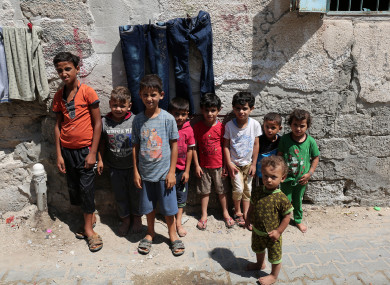There are 3.5 million refugee children not in school because of war and poverty

Globally, 91% of children attend primary school, compared to just 61% of refugee children.
More than 3.5 million refugee children of school-going age did not have the chance to attend school last year, the UN Refugee Agency has said in its latest report.
Some 1.5 million refugee children missed out on primary school, while 2 million refugee teenagers missed out on secondary school.
Of the 17.2 million refugees under the UNHCR’s watch, half are children.
“The education of these young people is crucial to the peaceful and sustainable development of the countries that have welcomed them, and to their homes when they are able to return,” Filippo Grandi, UN high commissioner for refugees said.
The report, Left Behind: Refugees Education in Crisis, compares the UNHCR’s statistics on refugee education with data from UNESCO on school enrollment around the world.
Globally, 91% of children attend primary school. For refugees, that figure is far lower at just 61%.
As refugee children get older, school attendance figures drop dramatically. Just 23% of refugee teenagers are enrolled in a secondary school, compared to 84% globally.
The UNHCR said the situation is critical in terms of third-level education. It said that despite big improvements in overall numbers thanks to investment in scholarships and other programmes, the percentage of refugees attending third-level education remains stuck at 1%.
The report calls for education to be considered fundamental to the response to the refugee crisis, and for it to be supported by long-term planning and reliable funding.
It urges governments to include refugees in their national education systems as the most effective, equitable and sustainable response.
Lack of resources
The report underlines the importance of quality teaching, and of the international support networks needed to keep teachers trained, motivated and able to make a positive impact on the “world’s toughest classrooms”.
Through a series of personal stories, the report indicates that while refugees are desperate to get an education, there are far too few teachers, classrooms, textbooks and support mechanisms to meet such enormous demands.
“Ensuring that refugees have equitable access to quality education is a shared responsibility. It is time for all of us to put words into action,” Grandi said.
The report found that the enrollment of primary-aged refugee children has risen over the past academic year, from 50% to 61%, due to improved policies and investment in education for Syrian refugees, as well as the arrival of refugee children in Europe, where education is compulsory.
“The progress seen in the enrolment of Syrian refugee children shows clearly the potential to turn around this crisis in education for refugee children,” Grandi said.
But the abysmal level of school enrolment for refugee children living in low-income regions clearly points to a need in investment in these often forgotten host countries.
Source: thejournal.ie